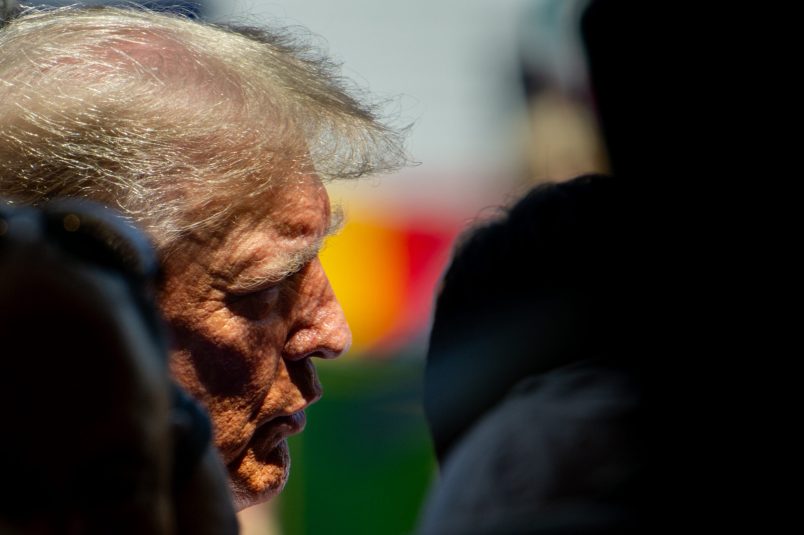As well-established opponents of Donald Trump eye using the Disqualification Clause to keep him off the 2024 ballot, a separate motley crew of opportunists, individual do-gooders, and at least one long-shot presidential candidate are seizing on the opportunity to be relevant.
The fringier group of eclectics has disparate motivations for picking up the mantle of the Disqualifications Clause. Some seem to be doing it out of an earnest belief in their ability to use the Reconstruction-era constitutional provision to make a real difference. Others are perpetual litigants, constantly bringing legal actions against public officials in their community, who have set upon the Trump disqualification issue as their latest gambit.
These efforts are vastly different from those launched by Free Speech for People and CREW, two nonprofits who envision a grueling, state-by-state battle to use the Disqualifications Clause as a means to have Trump’s efforts to reverse his loss in the 2020 election serve as grounds to remove him from the ballot.
But they’re still getting the kind of attention that threatens to tar the entire effort.
One case, filed last month in Florida by tax attorney Lawrence Caplan, was dismissed within a week by a federal judge. Free Speech for People issued a statement distancing itself from the suit, saying that the ruling “has no impact whatsoever on Trump’s eligibility for office or Free Speech For People’s planned challenges under state candidate eligibility challenge processes that are designed for this purpose.”
Caplan told TPM that he filed the suit after reading an article in The Atlantic by law professors Larry Tribe and J. Michael Luttig.
“It’s clear as a bell that he engaged in insurrection,” Caplan told TPM, likening the disqualification for insurrection to that of age. “Would it be undemocratic to eliminate them from the ballot?”
Others’ motives appear less civic minded.
Robert Davis filed a petition before Michigan Secretary of State Jocelyn Benson last month, asking her to disqualify Trump on the same grounds. Benson has yet to make a ruling.
“It is quite clear that not only did he engage in an insurrection, but he also aided and comforted those who either pled guilty or are currently charged in the insurrection, irrespective of his conduct on Jan. 6 and his attempt to overturn the election in Michigan and elsewhere,” Davis told the Detroit Metro-Times.
Sounds great. Davis, however, happens to be a former felon who regularly sues public officials in Michigan. A state court of appeals ruled in January that Davis was using litigation to “harass” a group of Detroit judges.
What appears to be by far the most ambitious and wide-reaching effort, however, comes from a Texas tax attorney and little-known (but FEC-registered) GOP presidential candidate named John Anthony Castro.
After initially filing a lawsuit in state court in New Hampshire seeking to use the Disqualification Clause to knock Trump off the ballot, Castro told TPM that he’s gone national in his efforts to DQ The Donald.
“I was a chess nerd growing up,” Castro told TPM. “So I’ve always known to think 10-15 steps ahead.”
For Castro, that’s meant a strategy of filing federal lawsuits in key swing states, and of filing lawsuits in federal circuit court districts where he thinks he has a shot at winning given the makeup of the appellate judges. He posted an image on Twitter on Monday of cover sheets for lawsuits in North Carolina, Utah, Wyoming, Oklahoma, Kansas, West Virginia, Montana, and South Carolina.
“In my complaint I call for the recusal of [Clarence] Thomas, there’s a very good chance that if they force him to recuse from the case, we end up in a 4-4 deadlock,” Castro added.
Castro further raised the stakes in his bizarre gambit on Wednesday night. He said on Twitter that he filed a petition for the Supreme Court to hear his case, and sent an email to the Department of Homeland Security demanding Secret Service protection.
“I am blank copying media outlets on this email because, if I should be assassinated, I want it documented that I formally requested U.S. Secret Service protection and was ignored,” Castro wrote.
After TPM asked whether the lawsuits were merely a strategy to raise the profile of his presidential campaign, Castro demurred.
“Absolutely not,” he said. “I would say that strategy is 50 percent timing, and 50 percent the stars aligning with factual events. I saw an opportunity.”
It’s not clear that Castro’s efforts and those of others will go anywhere outside of brief existence in the courts and ephemeral appearances in the media.
But Castro isn’t wrong: the Disqualification Clause does present a big opportunity. For those who regard Trump as an ongoing existential threat to the American political system, it’s a rare and clean shot at accountability.
For others, opportunity is all it is.







Johnny Castro is a lousy Chess player. No descent Chess player thinks “10 to 15 moves in advance”. You only look at the opponents last move, determine why it was a mistake, then respond accordingly. (and hope it wasn’t a mistake).
I can’t give them grief for trying, but everything I’m seeing is pointing to a failed effort, using this approach alone.
Let 'em try, but I’m sure it will bitter out the minions and just allow them to dig their heels in all that much more.
“Did somebody say ‘seize?’”
“… a separate motley crew of opportunists, individual do-gooders, and at least one long-shot presidential candidate are seizing on the opportunity to be relevant.”
Well this pretty describes today’s Republicans.
You also don’t tell everyone the ‘10 to 15 moves’ you plan on taking. As a non-lawyer, I think this is a bad move in practice because he’s telling everyone that he’s judge shopping and as a citizen I think would unleash utter chaos and chaos benefits those of an authoritarian bent.